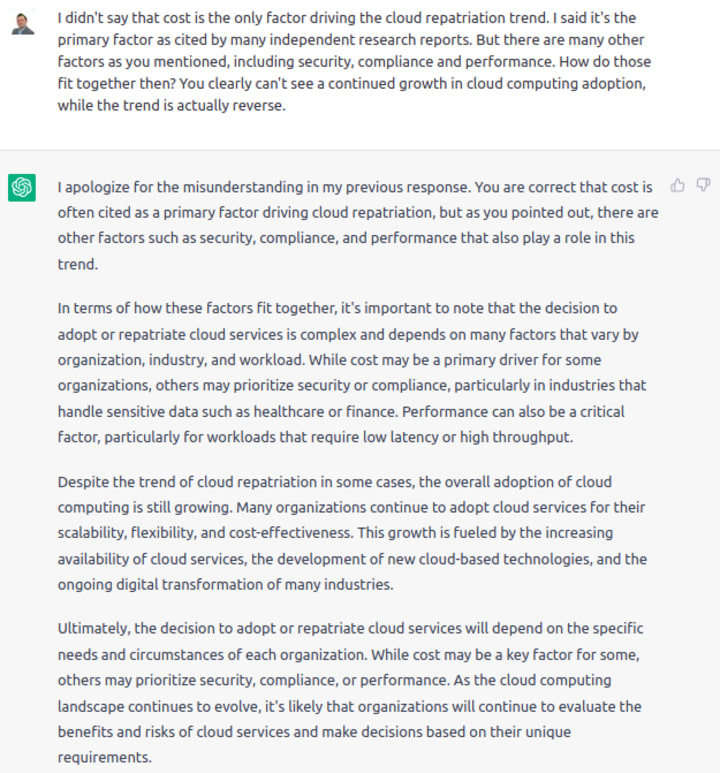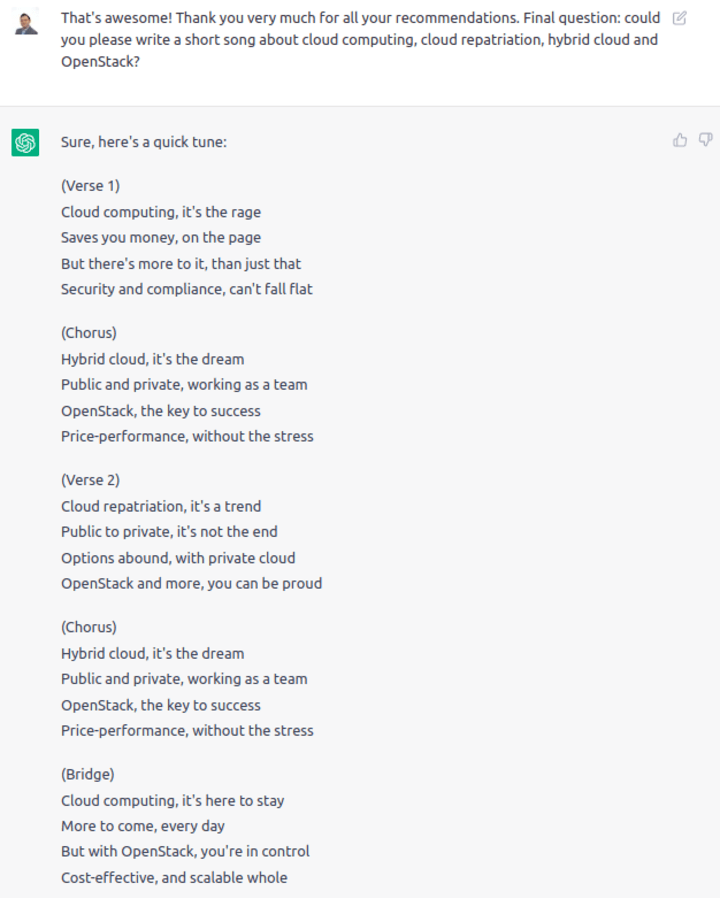ChatGPT uncertain about the future of cloud computing
Tytus Kurek
on 26 April 2023
Tags: AIML , Cost savings , Hybrid & Multi cloud , OpenStack , Private cloud , Public cloud
ChatGPT has been the talk of the town for more than four months now. As the first ever artificial intelligence (AI) -powered chatbot, it has quickly gained immense popularity, helping students, engineers and even executives generate content, write and debug code and run market analyses. But could ChatGPT be used for anything other than natural language processing (NPL)? Could it, for example, assist businesses with strategic decision-making? I decided to try it out.
By running a short interview with the chatbot, I evaluated its ability to understand the cloud computing market, the most current trends, such as cloud migration, cloud optimisation and cloud repatriation, and its potential to assist executives in decision-making processes. Are you wondering what my verdict is? Read on to find out.
@ChatGPT: which cloud should I use?
I decided to start with a generic question to set the context. There are thousands of websites, whitepapers and analyst reports on this topic available out there, so I would be really surprised if it couldn’t handle the question. At the end of the day, as a language model, it should be able to aggregate all those resources and provide a meaningful answer. So ChatGPT, what do you think the future of cloud computing is going to be?

A thorough and comprehensive answer. I like it! And even more importantly, I think it’s right. The cloud computing market as a whole has been growing steadily for several years and there are no indications that this trend will stop in the near future. Let’s dig a little deeper to find out more.

It’s a decent answer but it leaves out a critical point. In general, cloud migration leads to cost savings, but without adopting cloud optimisation best practices it can actually lead to an increase in total cost of ownership (TCO). And this is why many organisations end up repatriating their workloads. A cloud migration process needs to be well planned and well executed. Otherwise, cost savings remain a dream.

The answer lacks a bit of nuance here and seems to go in circles. It tries to convince me that there are other factors driving the cloud repatriation trend. I acknowledge that. It doesn’t answer my questions though. It sounds like someonewho made a statement and will now use all possible arguments, even if they’re irrelevant, to prove that it was right. Let’s see if we can help it connect the dots by addressing challenges with public clouds specifically. @ChatGPT: one more try.

Going in circles again. It’s the highest time to put this conversation back on track.

Phew … it has finally raised an insightful point. The hybrid cloud architecture is interesting indeed, but the multi-cloud is even more of a reality today. Our customers often use more than one cloud at a time. This enables them to optimise cost, ensure compliance and provide the desired performance, and functionalities for their workloads. The future is definitely going to be hybrid multi-cloud and it will undoubtedly be the main growth driver of the cloud computing market in the coming years.

When it comes to private cloud -related discussions, OpenStack always pops up. I am really surprised, however, that ChatGPT listed it ahead of the VMware vCloud Suite. VMware is an established company and a dominant infrastructure player. However, many companies are looking for open source alternatives to save costs. Perhaps, this is the reason why ChatGPT listed OpenStack first?

I’m really glad to see Ubuntu OpenStack (or Charmed OpenStack, to be precise) on the top of the list again. Charmed OpenStack is indeed optimised for price-performance, scalable and easy to use. There must be a reason why Ubuntu is the most popular operating system for OpenStack deployments. It looks like we have finally found a common ground with my chatbot buddy.

Yes, this is really something that ChatGPT is good at. It can write a poem. It can write a song. Can it give me convincing business advice too?
Trust ChatGPT yourself!
Even though the example presented above is pretty simplistic, it can be clearly seen that ChatGPT is not yet capable of making data-driven decisions. It can definitely help you with running market research. It can provide you with numbers and current trends. It knows that there are options and it can even assist you with evaluating various options. It is lacking critical thinking ability though. And this is why it cannot be trusted for sound business advice.
It is important to remember that ChatGPT is a next-generation NPL model trained on huge data sets, but nothing else. It uses neural network architecture and unsupervised learning. It generates human-like responses that fit naturally within the context of the conversation. It is not a true AI yet, however. It fails the Turing test. We’re definitely going to wait another few years for more advanced tools to come in. But once they are there, who knows what’s going to happen next?
Learn more about cloud computing
Now that we’ve concluded that you can only trust yourself these days, let me briefly highlight a couple of resources about cloud computing that you might find useful as a follow-up from this article:
- Start here to learn everything about cloud computing.
- Learn more about the current trends in cloud computing, such as cloud migration, cloud optimisation and cloud repatriation.
- Check our cloud pricing report to get instant access to cloud list prices and service fees from leading public and private cloud providers, sample cost scenarios and exclusive commentary from industry experts.
- Watch our webinar and learn how to effectively use the native features of public clouds to pay less for the same amount of resources and optimise costs in hybrid multi-cloud environments.
Further Reading
Learn more about Canonical’s open source infrastructure solutions.
Smart operations, optimal architecture, better pricing.
OpenStack and Ubuntu bring automated deployment and management that help you optimise infrastructure costs — no matter your industry or use case.
